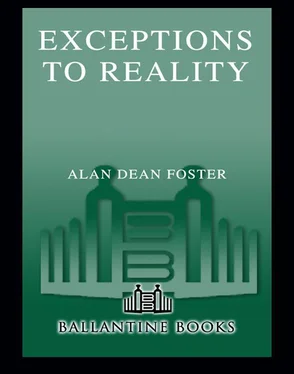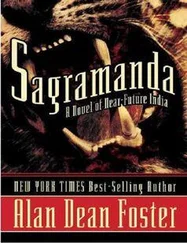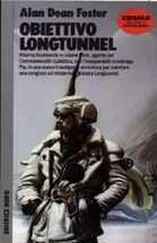Alan Foster - Exceptions to Reality
Здесь есть возможность читать онлайн «Alan Foster - Exceptions to Reality» весь текст электронной книги совершенно бесплатно (целиком полную версию без сокращений). В некоторых случаях можно слушать аудио, скачать через торрент в формате fb2 и присутствует краткое содержание. Жанр: Старинная литература, на английском языке. Описание произведения, (предисловие) а так же отзывы посетителей доступны на портале библиотеки ЛибКат.
- Название:Exceptions to Reality
- Автор:
- Жанр:
- Год:неизвестен
- ISBN:нет данных
- Рейтинг книги:4 / 5. Голосов: 1
-
Избранное:Добавить в избранное
- Отзывы:
-
Ваша оценка:
- 80
- 1
- 2
- 3
- 4
- 5
Exceptions to Reality: краткое содержание, описание и аннотация
Предлагаем к чтению аннотацию, описание, краткое содержание или предисловие (зависит от того, что написал сам автор книги «Exceptions to Reality»). Если вы не нашли необходимую информацию о книге — напишите в комментариях, мы постараемся отыскать её.
Exceptions to Reality — читать онлайн бесплатно полную книгу (весь текст) целиком
Ниже представлен текст книги, разбитый по страницам. Система сохранения места последней прочитанной страницы, позволяет с удобством читать онлайн бесплатно книгу «Exceptions to Reality», без необходимости каждый раз заново искать на чём Вы остановились. Поставьте закладку, и сможете в любой момент перейти на страницу, на которой закончили чтение.
Интервал:
Закладка:
Fanole nodded. “That’s right. Nothing dangerous here but the place itself. Don’t need any snakes or tigers. The swamp’ll kill you all by its lonesome.” He looked toward the entrance and nodded knowingly. “No landmarks, either. No sky overhead; only clouds. No ground underfoot; only a bottomless pit of composting plant matter. Even compasses act funny in here.”
Sanchez felt compelled to speak up. “Begging your pardon, sir, but we got through the first of the bogs okay.” He smiled apologetically. “Didn’t stay very dry, but we got through.” Reaching over, he tapped his pack. “Hard to get lost with a GPS.”
Fanole shook his head once. He didn’t smile. “‘The first of the bogs’? We haven’t even reached the bogs yet, kid. That was just muddy trail. I’ve personally sounded bogs here that were twenty feet deep. There are deeper still, but they ain’t been plumbed yet.”
“How come?”
“Nobody’s ever brought in a long enough measuring probe. Remember: we’re walking across the throat of an old volcano. Might be bogs a hundred feet deep. Maybe a thousand. Nobody knows. In the whole swamp there’s only two barely-there east–west trails and nothing at all running north to south. Your plan is to head off-trail and follow the line of the Wainiha Pali. Nobody’s ever gone in there and done that.” He snorted softly. “With or without a GPS.”
“Kinkaid went in,” Loftgren corrected him, “and Masaki.”
“Nobody knows that for certain.” Fanole’s eyes burned into those of the ornithologist. “Masaki got to the Kilohana Lookout. Nobody’s sure about Kinkaid. If you try to go north from there, you’ve got sheer cliffs on one side and unplumbed bogs on the other. I give you haoles about a day before you give up on it. If we make it that far.”
“I once spent a month in the highlands of New Guinea, Fanole. Don’t try to scare me.”
“I’m not.” The guide leaned back on his light sleeping bag. “You hired me for advice. I’m giving it. Just think it’s a lot to go through for a glimpse of a bird that’s probably been extinct since the ’seventies.”
“There have been reports of song-sightings since then,” Sanchez pointed out. “The survivors of Masaki’s party all confirm it.”
Fanole rolled onto his side, propping his head up on one big, weathered palm. “You stay out here long enough, it’s easy to start hearing things as well as seeing them.”
“Masaki vanished while tracking a singing akialoa,” Loftgren insisted stubbornly.
“Maybe.”
“Those with him heard it, too. The weather and the terrain got so bad, they all gave up and fell back, except Masaki. But they heard it.”
“Maybe.” The guide was incorrigible. “Next you’ll be telling me you expect to find an o‘o‘a‘a, too.”
“No.” Loftgren’s voice dropped. “No, I’m afraid the o‘o‘a‘a is gone. But not the akialoa. I won’t accept it. It’s too beautiful to not exist any longer.”
From his file pouch he drew forth a folded eight-by-ten. Like every other picture he carried, like every map, it was laminated to protect it from the all-pervasive, all-destroying moisture. Unfolded, it revealed a painting of a small bird with a distinctive brown patterning and a lighter buff underbelly. Attractive but hardly spectacular.
Except for the downward-curving sickle-beak, which was fully one-third the length of the creature’s body. It was this remarkable protuberance that set the akialoa apart from its immediate relatives and for that matter, from all but a few other birds in the world. It had last been seen in the Alakai in 1973, and the possibility of its continued existence was the reason for Loftgren’s university-sponsored expedition.
To find the akialoa, he mused as he gazed at the painting, the details of which he knew as intimately as those of his own body. Finding it would guarantee publication in Science, Natural History, the Smithsonian, National Geographic —they would be fighting one another for the right to be first to publish his words and pictures. A coup for the department and for the entire university. Perhaps a chair dedicated in his name. Promotion to professor emeritus of ornithology. The world would be his—or at least that small portion of it that concerned itself with birding.
Kinkaid had plunged into the Alakai seeking the elusive scimitar-billed bird and had vanished. So had the esteemed Masaki. Now it was his turn, and he fully intended to succeed where they had failed. If the akialoa still lived, it would be left to professional ornithologists such as himself to devise a scheme for ensuring its survival. Only they had the knowledge and ability to do so.
But first he had to find one.
The rain was lighter when they awoke. Carefully, they packed their equipment and set out again. Halfway up a steep, slippery, moss-bedecked slope he was delighted to find an outcropping of ohi’a trees. Fully mature at eight inches high, they were all more than a hundred years old. Later he spotted a thriving specimen of gunnera, the world’s largest herb, with its unique eight-foot leaves. Miniature trees and giant herbs. Reversed proportions, he reflected, were the norm in the Alakai.
Later that day the sun came out and they saw their first birds. Sanchez picked up a pair of bright red apapane, but it was Fanole who pointed out the endemic anianiau and the rarer i’iwi. Loftgren felt left out until he saw a tiny elepaio sheltering from the sun beneath a palapali fern.
Of the akialoa, however, there was no sign.
It was raining seriously when they entered the first bogs, edging around them where possible and wading through—sometimes up to their waists—when it was not. Fluttering fragments of fluorescent tape tied to tree branches were all that marked the trail, and these were hard to see in the fog that had settled over the swamp. Several times Loftgren had to admit he would have been lost without Fanole to lead the way.
On the third morning they turned off the intermittent trail and plunged into abject wilderness.
No one bothered to comment on the damp anymore because they were all soaked from head to foot. It was a distinctive, all-pervasive dampness that made you feel as if your skin were slowly sloughing off your body. White ridges appeared on palms and fingers; it felt as if at any minute your flesh would burst into flagrant, pustulant bloom. Forward progress was now measured in yards instead of miles.
By the end of the week the formerly resolute Sanchez had had enough.
“I want out, Martin.” Despite the protection offered by the battered but still-intact slicker, water trickled down the graduate student’s sensitive face into his eyes and mouth and ears.
Loftgren regarded him sternly. “There’s no ‘out,’ here, Julio. This isn’t a library research project. We stay until we’ve found what we came for or until we run out of supplies.”
Fanole materialized silently at the frustrated student’s shoulder. “The kid’s right. We’re in too deep as it is. If we keep going this way and don’t manage to hook up with the Mohihi Trail, we won’t get out of here.”
“You’ll find the Mohihi.”
“Maybe. I’ve never gone this way before. No one ever has. We could step right off the damn Pali or stumble into Waialeale. You know damn well nobody’s gonna spot us from the air because the cloud cover only breaks fully maybe once, twice a year. No emergency helicopter pickups in here, mister. I say it’s time to leave. You got what you paid for.”
“I paid for an akialoa. We have plenty of food left.”
“We’ve been slogging and bogging for four days and we haven’t seen a hint of one. Nobody knows exactly where we are, and in an emergency it wouldn’t matter if you could raise someone on that satellite phone tucked in your pack anyway. It’s time to go.”
Читать дальшеИнтервал:
Закладка:
Похожие книги на «Exceptions to Reality»
Представляем Вашему вниманию похожие книги на «Exceptions to Reality» списком для выбора. Мы отобрали схожую по названию и смыслу литературу в надежде предоставить читателям больше вариантов отыскать новые, интересные, ещё непрочитанные произведения.
Обсуждение, отзывы о книге «Exceptions to Reality» и просто собственные мнения читателей. Оставьте ваши комментарии, напишите, что Вы думаете о произведении, его смысле или главных героях. Укажите что конкретно понравилось, а что нет, и почему Вы так считаете.










